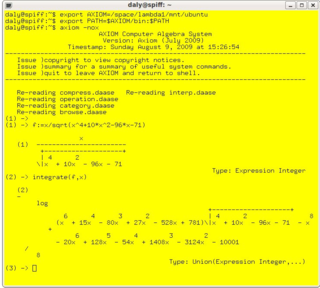A computer algebra system (CAS) or symbolic algebra system (SAS) is any mathematical software with the ability to manipulate mathematical expressions in a way similar to the traditional manual computations of mathematicians and scientists. The development of the computer algebra systems in the second half of the 20th century is part of the discipline of "computer algebra" or "symbolic computation", which has spurred work in algorithms over mathematical objects such as polynomials.
Computer science is the study of the theoretical foundations of information and computation and their implementation and application in computer systems. One well known subject classification system for computer science is the ACM Computing Classification System devised by the Association for Computing Machinery.

Avinash C. Kak is a professor of Electrical and Computer Engineering at Purdue University who has conducted pioneering research in several areas of information processing. His most noteworthy contributions deal with algorithms, languages, and systems related to networks, robotics, and computer vision. Born in Srinagar, Kashmir, he did his Bachelors in BE at University of Madras and Phd in Indian Institute of Technology Delhi. He joined the faculty of Purdue University in 1971.

Theoretical computer science (TCS) is a subset of general computer science and mathematics that focuses on mathematical aspects of computer science such as the theory of computation, formal language theory, the lambda calculus and type theory.
Algorithmic topology, or computational topology, is a subfield of topology with an overlap with areas of computer science, in particular, computational geometry and computational complexity theory.

CoCoA is a free computer algebra system developed by the University of Genova, Italy, used to compute with numbers and polynomials. The CoCoA Library (CoCoALib) is available under GNU General Public License. CoCoA has been ported to many operating systems including Macintosh on PPC and x86, Linux on x86, Unix x86-64 & PPC, Solaris on SPARC and Windows on x86. CoCoA is mainly used by researchers, but can be useful even for "simple" computations.
In mathematics and computer algebra, factorization of polynomials or polynomial factorization expresses a polynomial with coefficients in a given field or in the integers as the product of irreducible factors with coefficients in the same domain. Polynomial factorization is one of the fundamental components of computer algebra systems.
In mathematics, a square-free polynomial is a polynomial defined over a field that does not have as a divisor any square of a non-constant polynomial. A univariate polynomial is square free if and only if it has no multiple root in an algebraically closed field containing its coefficients. This motivates that, in applications in physics and engineering, a square-free polynomial is commonly called a polynomial with no repeated roots.
Fermat is a program developed by Prof. Robert H. Lewis of Fordham University. It is a computer algebra system, in which items being computed can be integers, rational numbers, real numbers, complex numbers, modular numbers, finite field elements, multivariable polynomials, rational functions, or polynomials modulo other polynomials. The main areas of application are multivariate rational function arithmetic and matrix algebra over rings of multivariate polynomials or rational functions. Fermat does not do simplification of transcendental functions or symbolic integration.
In computer algebra, the Faugère F4 algorithm, by Jean-Charles Faugère, computes the Gröbner basis of an ideal of a multivariate polynomial ring. The algorithm uses the same mathematical principles as the Buchberger algorithm, but computes many normal forms in one go by forming a generally sparse matrix and using fast linear algebra to do the reductions in parallel.

Arjen Klaas Lenstra is a Dutch mathematician, cryptographer and computational number theorist. He is a professor emeritus from the École Polytechnique Fédérale de Lausanne (EPFL) where he headed of the Laboratory for Cryptologic Algorithms.
Wenjun Wu's method is an algorithm for solving multivariate polynomial equations introduced in the late 1970s by the Chinese mathematician Wen-Tsun Wu. This method is based on the mathematical concept of characteristic set introduced in the late 1940s by J.F. Ritt. It is fully independent of the Gröbner basis method, introduced by Bruno Buchberger (1965), even if Gröbner bases may be used to compute characteristic sets.
Computational thinking (CT) refers to the thought processes involved in formulating problems so their solutions can be represented as computational steps and algorithms. In education, CT is a set of problem-solving methods that involve expressing problems and their solutions in ways that a computer could also execute. It involves automation of processes, but also using computing to explore, analyze, and understand processes.
Lateral computing is a lateral thinking approach to solving computing problems. Lateral thinking has been made popular by Edward de Bono. This thinking technique is applied to generate creative ideas and solve problems. Similarly, by applying lateral-computing techniques to a problem, it can become much easier to arrive at a computationally inexpensive, easy to implement, efficient, innovative or unconventional solution.
Mark Richard Jerrum is a British computer scientist and computational theorist.

In mathematics and computer science, computer algebra, also called symbolic computation or algebraic computation, is a scientific area that refers to the study and development of algorithms and software for manipulating mathematical expressions and other mathematical objects. Although computer algebra could be considered a subfield of scientific computing, they are generally considered as distinct fields because scientific computing is usually based on numerical computation with approximate floating point numbers, while symbolic computation emphasizes exact computation with expressions containing variables that have no given value and are manipulated as symbols.
Deepak Kapur is a Distinguished Professor in the Department of Computer Science at the University of New Mexico.





